Toronto groups mark 51st martial law anniversary with a protest rally vs Marcos Jr repression
Toronto groups mark 51st martial law anniversary with a protest rally vs Marcos Jr repression
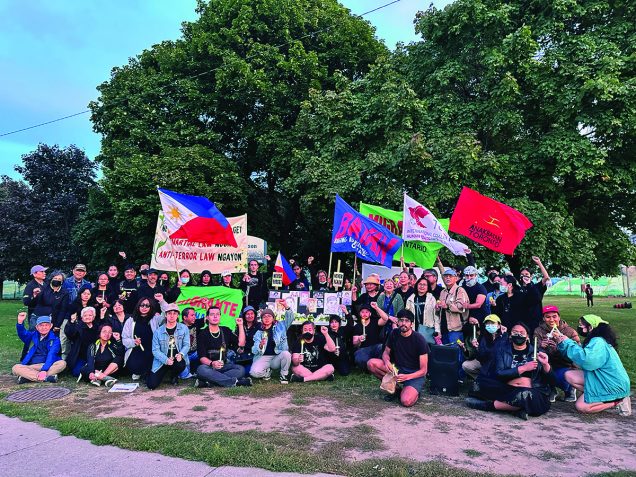
Photo: Sophia de Guzman
By Sophia de Guzman
LJI Reporter
The Philippine Reporter
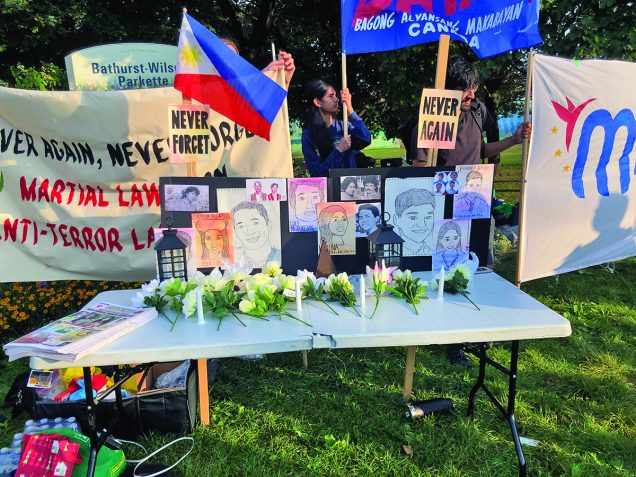
Altar with portraits of human right victims.
Filipino activists and community organizers gathered at Bathurst-Wilson Parkette in Toronto to commemorate the 51st anniversary of former president Ferdinand Marcos Sr. declaring martial law in the Philippines in 1972.
On Saturday (Sept. 23, 2023), speakers, youth, community members and organizers held a vigil to remember the history of this event and highlight the legacy of the oppression that still lives on today in the Philippines under Marcos Sr.’s son and current president, Ferdinand Romualdez Marcos Jr., commonly known as “Bongbong” Marcos.
On September 21, 1972, former president Ferdinand Marcos Sr. declared martial law in the Philippines, in response to the rising student and workers activist movement, also known as the First Quarter Storm, sending the country into one of the most repressive periods in its history. The official declaration that marked the beginning of this era was called Proclamation 1081, and crucially, it gave Marcos dictatorial powers over Filipinos by enforcing curfews, banning group assemblies, and other severe limitations on individual freedoms. The most notable characteristic of this time was the suspension of the writ of habeas corpus – which allowed the government to arrest Filipinos without arrest warrants.
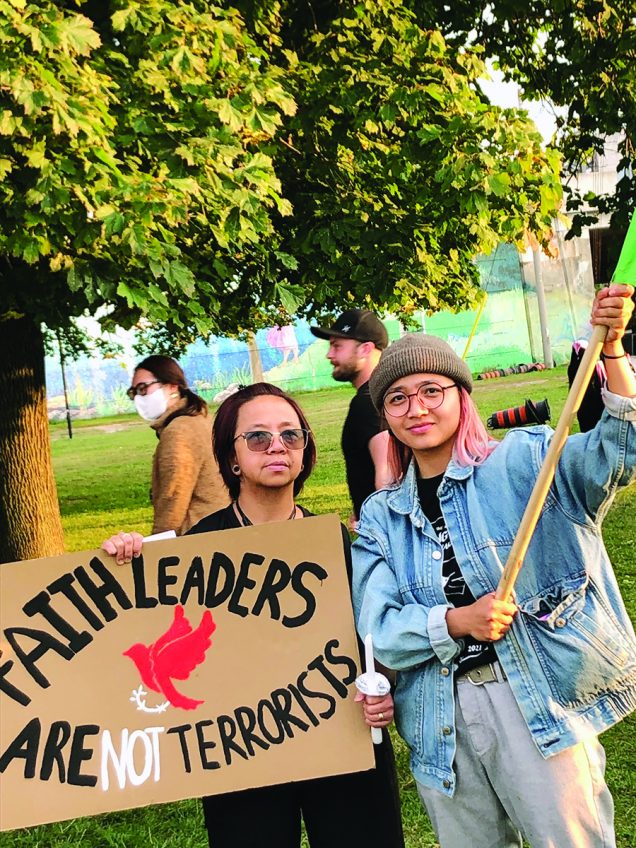
Juli and Jazz Manalang of Radyo Migrante
Those at the demonstration consisted of organizers and community members from groups across Toronto that work to promote human rights and national democracy in the Philippines, several of them survivors of martial law imprisonment themselves. Individuals from Anakbayan Toronto, Malaya Canada, Migrante Ontario, International Coalition for Human Rights in the Philippines and Canada-Philippines Solidarity Organization gave statements in solidarity with the victims of Martial Law, and those who are still impacted by the poor humanitarian and economic situation in the country.
“Under the guise of a counter-insurgency war, Marcos Jr. and his cronies are repeating the violent tactics of Marcos Sr. to quell any kind of legitimate dissent. While they may fervently deny it, we know for a fact that the current situation in the Philippines is one of de facto martial law,” said Sarah Oh, a member of the International Coalition Human Rights in the Philippines, or ICHRP.
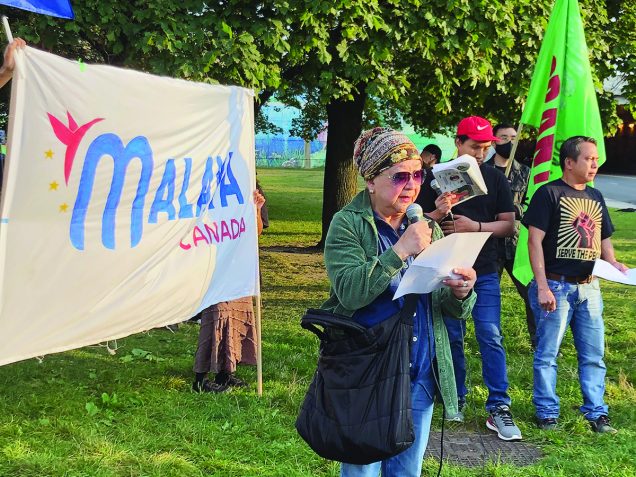
Olivia of Malaya
Speakers spoke about the different crimes and tactics of the Marcos Sr. government to suppress the growing grassroots activism that would eventually oust him: the rampant enforced disappearances, the use of torture and the detention of political prisoners. The Philippine Reporter’s own editors Mila and Hermie Garcia spoke to the Marcos Sr. government’s use of “red-tagging”, or a tactic used by the government to track and silence activists organizing against the government, tagging them as “terrorists” to justify the use of force against them.
“Red-tagging targets media workers, community leaders, activists, Indigenous minorities, and government critics. They are all tagged as communists and terrorists! Human rights, free speech, and peaceful action are considered irrelevant,” said Garcia.
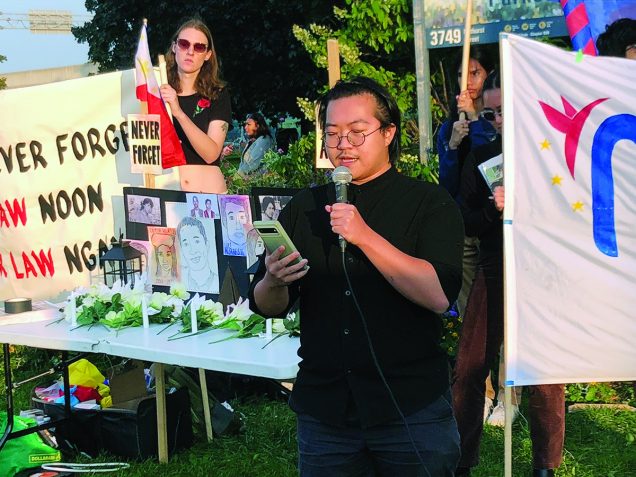
Min Zhu of ILPS
The Philippine news media eroded during this time, The Philippine Daily Inquirer reports over 600 media outlets closing after the declaration of martial law due to state-enforced censorship.
At the height of the demonstration, organizers built a vigil for the victims that held candles and portraits of some of those who were “disappeared” or killed by the military or police during the Marcos Sr. regime. According to data collected by Amnesty International and published by The Philippine Inquirer, this happened to over three thousand Filipinos during the 14 years that Marcos ruled with martial law powers. According to the same data, around 34,000 Filipinos were tortured by state forces, as well.
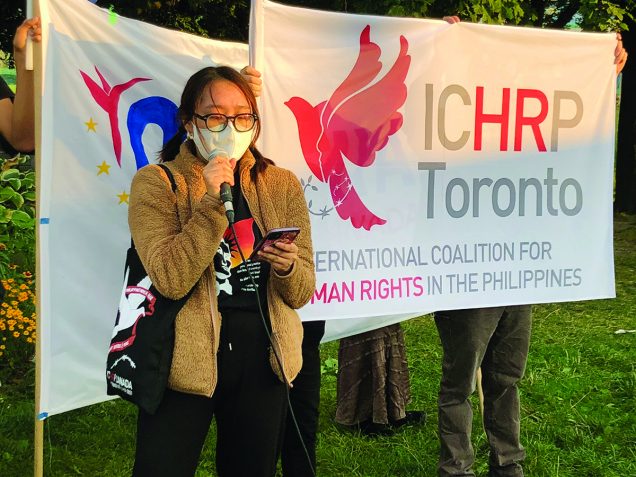
Myka of Anakbayan
On September 19, two days before the martial law anniversary, during a press conference organized by the National Security Council and the National Task Force to End Local Communist Armed Conflict, Jonila Castro and Jhed Tamano spoke against the narrative told by the government, which stated that they were surrenderees from the CPP-NPA, and revealed that they were actually activists aiding fisherfolk and communities impacted by the government’s reclamation project in Manila Bay and had been taken hostage by the military earlier in the month and kept without the knowledge of their families, the media, legal workers or any human rights advocacy groups.
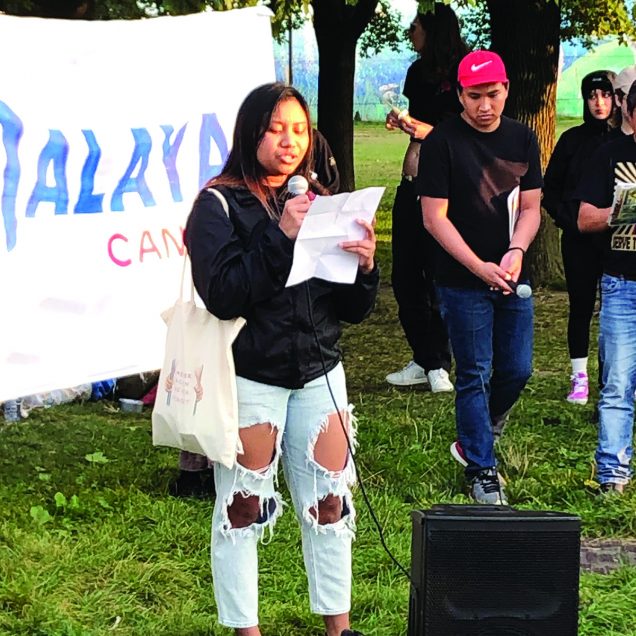
Hannah of Anakbayan
Photos: HG and Sophia de Guzman
Since, Jonila and Jhed have been released to be with their families and the NTF-ELCAC has stated that it “felt betrayed” by the activists’ allegations and denied them completely.
Many human rights advocacy groups, such as Migrante Ontario, are pointing to this as proof that, although Marcos Sr.’s regime ended in 1986 and martial law is no longer in place in the Philippines, oppression and human rights violations live on today.
Migrante Canada said this in their statement on Jonila and Jhed’s release, “It is a grim reminder that Marcos Jr. does not need to officially declare martial law to terrorize the people. He does not need this to commit gross violations of human rights against activists, critics, people’s organizations, order the bombings of indigenous lands, sanction the extrajudicial killings, abductions and enforced disappearances, file malicious charges in court against activists, freeze people’s assets, allow development aggression on Indigenous lands, continue to hold political detainees behind bars, and many more evil hallmarks of a dictatorship.”
Comments (0)